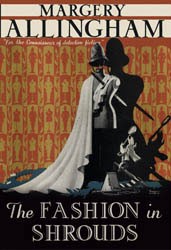 I remembered why I didn’t read many crime novels by Margery Allingham. Of the books I’ve read so far, Her writing is gibberish to me. Excepting Traitor’s Purse, that is. That book is on my list for the very reason that it’s not remotely like any others she wrote. It’s straight forward, with regular language, no affectations, no upper class slang, no slightly comic protagonist. In that book, which is about amnesia, you are given the viewpoint from someone whose world is unknown, and in his finding the way back, you come to finally respect and understand Albert Campion.
I remembered why I didn’t read many crime novels by Margery Allingham. Of the books I’ve read so far, Her writing is gibberish to me. Excepting Traitor’s Purse, that is. That book is on my list for the very reason that it’s not remotely like any others she wrote. It’s straight forward, with regular language, no affectations, no upper class slang, no slightly comic protagonist. In that book, which is about amnesia, you are given the viewpoint from someone whose world is unknown, and in his finding the way back, you come to finally respect and understand Albert Campion.
In the book preceding Traitor’s Purse, the subject matter is far less serious–the fashion industry and the dilettante upper echelon within that world. An self centered artfully innocent actress; her diplomatic husband; Campion’s designer sister; a decorated pilot; a theatrical producer; an entrepreneur of a huge hotel and country club compound; a mannikin; are characters in a story so convoluted and full of period and upper class slang, I couldn’t make heads or tails of it. I began to skip ahead, go back again, and finally gave up, skimming the last chapter, with a slim curiosity as to who did it. The Fashion in Shrouds may be a scathing satire of the upper crust, if so, I’d have never guessed from the incomprehensible manner with which she tells a story. She also tends to jump from one thought to another, without the proper info between. For example, when Traitor’s Purse begins Campion is unable to remember Amanda, but he begins to feel how much he must love her. At the end of Fashion, they are only jokingly engaged, upon reacquainting after 6 years absence. Allingham throws her characters into emotions and situations that have no foundation from the book before. Or even before that. How could Campion be that ardent about someone with so little history? I think Traitor’s Purse should be considered a stand alone for the very reason it is written like no other Campion novel, with realism and truth.
And that’s been my experience with Allingham all along. But I’d forgotten the fact after rereading Traitor’s Purse. I looked forward to discovering her other Campion works. And then I read a little bio within a book of various detective authors lives, and after that, wondered how she wrote at all. The chaos of her life, the financial burdens should have killed another person. Instead, she endured countless infidelities from her husband, his spendthrift ways of disposing of her income, a mother whose sanity had snapped, and an endless work schedule of writing, any sort of writing–romances under a different name, etc., just to pay the bills. What’s more, she was not from a rich background, although that’s the background and usually the setting for her mysteries. Perhaps my thoughts about how fake and silly the characters’ affectations are, is justified. Allingham may have created a fantasy upper class. I hope so, because the characters peopling her books are vacuous, one dimensional and dull. Sometimes learning more about an author makes one’s view of the work alter. It did in this case. I found more reason to ignore the rest of her output and stick to the one piece I felt was full of authentic emotion. The rest really are incomprehensible.
